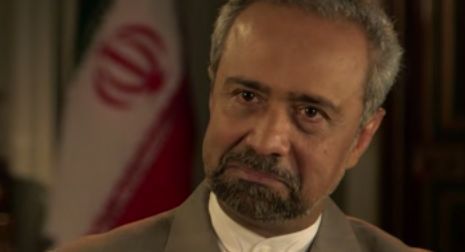Today’s Top Stories
1. Israeli airstrikes on Gaza targets killed nine terrorists and destroyed several underground rocket launchers. The Jerusalem Post notes:
At least 150 rockets have landed in Israeli territory since June 14 when the West Bank operation to find three Israeli teens kidnapped and murdered by Hamas commenced , the IDF said Sunday.
One Grad hit Beersheva, and Gaza terrorists fired an anti-tank rocket at an IDF unit patrolling the border. According to the Times of Israel, no injuries were reported and the IDF returned fire. The Israeli cabinet’s discussing possible retaliation. More at Haaretz‘s live-blogging.
 2. The latest Gaza escalation isn’t a function of “resistance,” but of cash flow. Avi Issacharoff explains:
2. The latest Gaza escalation isn’t a function of “resistance,” but of cash flow. Avi Issacharoff explains:
It would appear as if Hamas’s weakness in Gaza and the renewal of rocket fire by the Islamist group stem from the salary crisis and the failure of the reconciliation deal with Fatah. At present the organization does not possess the means to pay its people’s salaries. Its greatest concern is that public frustration in Gaza will ultimately be directed at its members. Perhaps, then, Hamas feels it’s better to create tension with Israel (not a full-scale escalation) in a bid to increase pressure on Egypt to permit the transfer of funds or salaries to the Gaza Strip.
On Friday evening, an anonymous senior Hamas official spoke to the Palestinian Sawa news agency. He said that “those who expect Hamas to stop the rocket fire (against Israel), should turn to (Palestinian Authority Prime Minister) Rami Hamdallah.” He added that the situation in the Gaza Strip was the consequence of not paying Hamas clerks’ salaries.
In other words: Salaries in exchange for calm.
Indeed, the Times of Israel reports that when Mahmoud Abbas called Khaled Mashaal about dialing down the rocket fire, this was Mashaal’s response:
Mashaal, for his part, requested that Abbas work to strengthen the Hamas-Fatah unity pact, even as other Palestinian officials demanded that the Palestinian Authority dismantle the Hamas-backed government.
Don’t tell me the rocket fire is related to the IDF’s “heavy handed” search for the kidnapped teens or Mohammed Khdeir.
3. Three suspects arrested in the Mohammed Khdeir murder confessed. For more on the aftermath of the six Israelis arrested for murdering Mohammed Khdeir, see followup at the Washington Post.
The arrests shocked those on both sides of the Israeli-Palestinian divide — Palestinians because many had assumed Israel would never act against its own, and Israelis because there had been widespread doubt that Jews could have carried out such a heinous crime.
Israel and the Palestinians
• Shimon Peres and Reuven Rivlin co-wrote a YNet commentary calling for an end to hatred, incitement and violence.
We are allowed to argue. We even have to argue. We, all of us, have all the ways to express our pain, our opinion and our world view. But incitement is not the way. Collective accusation is not a solution.
It is our duty to stop the journey of incitement.
• The Times of London picks up on one ray of light, as the Fraenkel and Khdeir families reach out to each other.
Yesterday two Palestinians, accompanied by a Rabbi arrived at the Fraenkel’s family home to express their sorrow for their loss.
One of the visitors told the Hebrew NRG website that Fraenkel family’s statements following Mohammed’s murder “touched a large portion of the Palestinian people.”
• Meet the Proud Mother of the Palestinian Man Accused in Death of Israeli Teens
• Palestinians trying to burn down the Tomb of Joseph in Nablus were turned back by PA security forces. So much for the Palestinian claim that the tomb houses the remains of a Sheikh Youssef.
• For more commentary/analysis, see David Horovitz (Sobering moment for complacent Israel), Elhanan Miller (Conditions not ripe for a 3rd intifada), Dror Eydar (World only cares about Jewish killers), Andrew Bolt (Israel’s shame), David Weinberg (No moral symmetry), Yoav Limor (Cease fire needs braking distance),
Rest O’ the Roundup
• Iraqi Kurds are consolidating their control over territory, navigating their way through Iraq’s break up towards statehood. According to the Washington Post, they’re continuing to smartly build leverage for statehood.
• Hindsight’s always 20/20, right President al-Sisi?
Egypt’s president acknowledged for the first time that the heavy sentences handed down to three Al-Jazeera journalists had a “very negative” impact on his country’s reputation, saying he wished they were never put on trial.

• Bloomberg News reports that Iran’s about to blink:
Iranian President Hassan Rouhani may name his American-educated chief of staff to be the country’s next envoy to the United Nations, after the U.S. denied a visa to his previous choice.
Rouhani is considering Mohammad Nahavandian, 60, who holds a Ph.D. in economics from George Washington University, for the position, according to two UN Security Council diplomats and one European diplomat, who asked not to be identified because they weren’t authorized to comment. Nahavandian also has been cited as the likely nominee in Iranian media.
In April, the Obama administration denied a visa to Hamid Aboutalebi after Bloomberg News reported on his involvement with the militant group that seized the U.S. Embassy in Tehran in 1979 and held 52 Americans hostage for 444 days.
• India and Israel discuss raising defense cooperation.
Image of skull and money via Openclipart/j4p4n, Nahavandian via YouTube/60Minutes
For more, see yesterday’s Israel Daily News Stream and join the IDNS on Facebook.



